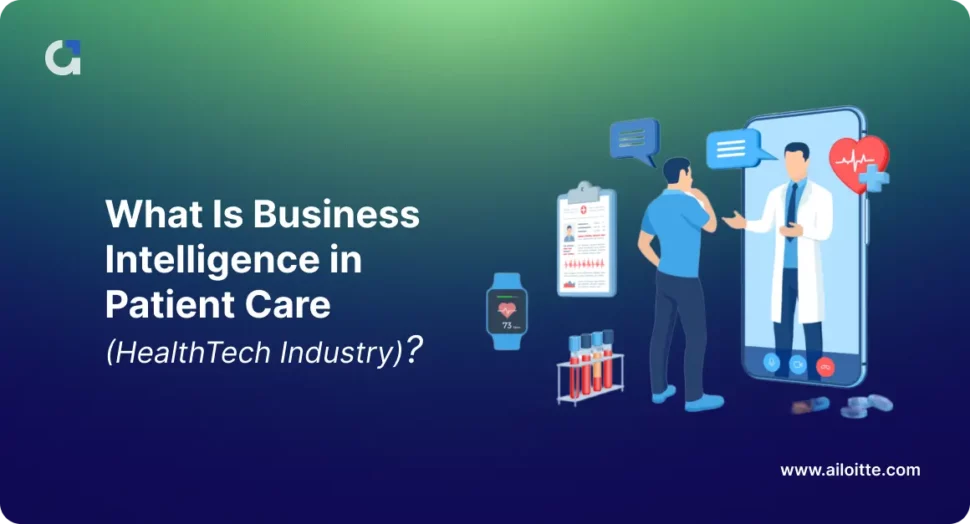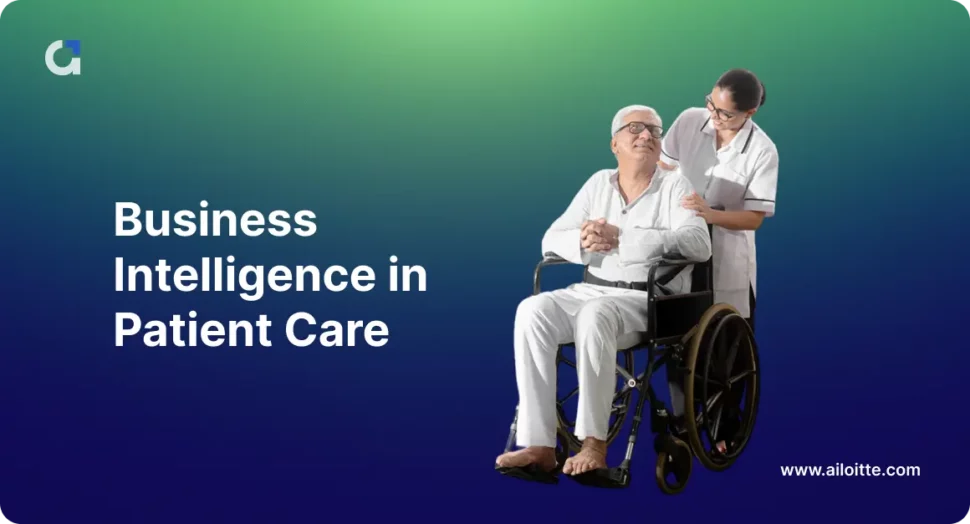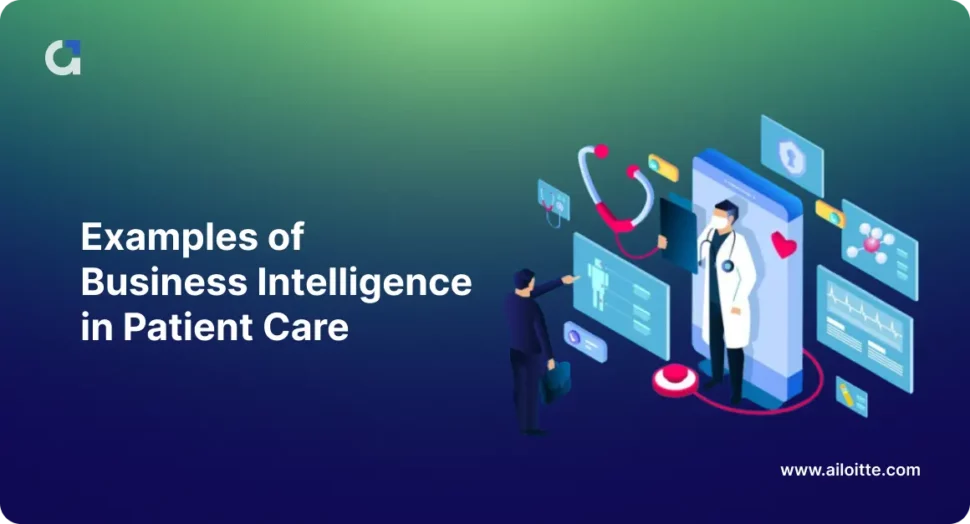This is the transition period whereby business intelligence now serves as a link that turns raw data into useful information. The fusion of modern technologies and business intelligence is maintaining the very fabric of patient wellness.
In the past, the healthcare network was somewhat unpredictable. Artificial intelligence takes over the role of the guiding light that shines its light onto the road to innovative patient care.
When we talk about making sure that the patients get the right care at the appropriate time then the Business information stands as the connector. It is making sure that medicine is not a privilege but rather a major right that is actually moving the revolution forward.
The story of healthcare IT solutions revolves around business intelligence, not only as a tool but as the main character; this data is now the heart of a world almost connected and healthier.
As technology reshapes healthcare, the business intelligence solutions will be at the center stage, directing the reality-based decisions. They don’t only observe; they seem to forecast trends with all their clarity. Through the analysis of trends and activities, they give ways of a healthcare future where all decisions are well-educated.
Hence, you are warmly welcomed to the period in which knowledge is not just power, but a pulse of the medical revolution.
What Is Business Intelligence in Patient Care (HealthTech Industry)?
Before we begin to understand what Business Intelligence in Patient Care is, we have to understand what exactly is Business Intelligence. And the fact is, it really means the way of presentation of data that makes it helpful for businesses. Therefore, BI conveys the data an organization gets from its departments and helps in making better decisions and increasing productivity.
Now you accept the role that it has in patient care; just think of it as a health organization that is overcome with data like patient records, appointments, and many other things.
In this, BI will help you arrange your already existing data in such a way to make it much easier for you to search for any information you need about your patients, if it exists on their records.
Moreover, patient groups will also help with the grouping of patients according to particular criteria, e.g., similar diagnoses, treatment timing, and also allow practice for special treatment for patients in the specific group.
In a simple concept, having BI in Patient Care is the same as possessing the ability to understand the data simply as to make the health care experience more intelligent, personalized and healthier for all.

Benefits of Business Intelligence in Patient Care

Business Intelligence (BI) is the first priority for patient experience involvement, revenue increase and cost reduction in healthcare operations.
Healthcare IT solutions are noticing major advantages of BI in this respect, causing a revolution in healthcare management from many dimensions.
Operational Efficiency
Efficiency is greatly required in the healthcare system to ensure enhanced patient care. Incorporation of medical business intelligence leads to a reduction of problems in hospitals which allow them to operate at their peak. This intelligence allows complex data to become realistic solutions. Its goal is to reduce everything related from admitting patients till discharging them.
It also makes sure the data is there when the need arises through proper data management. These small changes make a big difference approaching the patient as a whole.
Cost Reduction
When a healthcare organization makes financial plans, it must stay on track and be prepared for the future. By applying Healthcare BI (BI), healthcare organizations can not only reduce spending but keep quality care at high level as well.
In-depth analytics allow the hospitals to prevent overspending, thus avoiding financial leakages.
Healthcare technology solutions provide opportunity for improved supply chain management, administrative costs reduction, standardization of care protocols and decisions avoiding unnecessary procedures through.
Through prediction technologies in health care, healthcare business analytics prevents the emergence of health issues and delivers the treatment before the situation becomes critical and expensive. It is an economic use of medical resources which leads to money savings as well as increase in patient satisfaction.
In the long term, these cost savings may be turned into investment channels that improve patient care and hence promote the sustainability of the healthcare system. Smart analytics can save money and the money so saved can help to provide better treatment and health outcomes.
Risk Management
Providing high quality healthcare technology solutions is indeed a huge task, and the healthcare intelligence business plays a great role. It is one of its key benefits by conducting analysis that predicts and thus prevents inconveniences to patients.
Risk management should be done prospectively in terms of eliminating errors and protecting the patient’s personal information and security. Healthcare IT solutions provide a source of assets, those prevent complications and elevate safety measures.
This way of planning provides facilities to detect and prevent any hazards that result in safe and effective patient care. The hospital will be able to make proactive decisions by carefully collecting data in order to identify any risks and prevent deaths of patients as well as expensive mistakes.
Improved Patient Experience
Healthcare business intelligence systems are the elements that should be integrated if those goals of the higher standards of patient outcomes, care quality improvement, and operations efficiency are to be reached. Having a good patient healthcare experience is a very important factor of patient satisfaction and using business intelligence in hospitals is an additional factor of this. It makes visible users’ interests and personality, resulting in an individualized approach to the healthcare system.
Customizing services to clients involving them in care and improving simplification of operations is an important benefit of using business intelligence in healthcare IT solutions. Satisfied customers appear to seek medical instructions and maintain the treatment.
This patient approach helps to improve the hospital reputation, something that is very important in terms of healthcare business. Healthcare analytics with an advanced business model support internal optimization of the patient care and keep the patients actively engaged.

Examples of Business Intelligence in Patient Care
Let’s figure out the main ways by which BI (business intelligence) contributes to patient care, highlighting the importance of data in healthcare IT solutions.

Clinician-Driven Data Analysis for Enhanced Care
The use of business intelligence among doctors in healthcare means that decisions being made are life-saving. They use patient data to generate treatment plans, and they are personalized which leads to more exact diagnosis and treatment. Using trends, medical practitioners would be able to sense any health problems before it gets severe.
Business intelligence also helps to assess the success level of the treatments. Using live information, doctors can make immediate changes to treatment plans. They can now monitor their disease status over a longer period as they can access this information. It is not only reacting, rather, it involves promoting patients’ well-being and health.
For example, business intelligence can assist in forecasting when patients will be arriving again at the hospitals and can detect those at the higher risk. This shortens the frequency of time hospital visits from patients.
Improving the financial performance of care services
For quality healthcare IT solutions, finances are important. Applying business analytics in the healthcare sector can achieve the objectives of reducing costs, ensuring that the money is channeled towards helping patients most effectively.
Through business intelligence, the loss of the money is reduced. It means that obviously hospitals can acquire new equipment that will enhance their services to patients. They have the opportunity to take advantage of new technologies and infrastructure.
Financial data analytics also leads to creating reasonable prices that let as many patients benefit from the healthcare IT services as possible. Finally, good financial management is a requirement for excellent quality of care.
Streamlining the Development of Pharmaceuticals
Employing business intelligence in healthcare for pharmaceutical research and production makes it extra streamlined. It facilitates a rapid data analysis in clinical trials so the drug testing process becomes speedier. This process brings about an earlier finding of effective compounds and a timely release of the drugs into the market.
Health business intelligence stands as one of the most important factors in the supervision of live drug trials. It has the capacity to identify which subset is prone to which novel therapies. On the other hand, it allows organizations to be more agile and address changes in the rules and consumer needs. Being fast is one of the most important in the case where the time and accuracy are the key factors.

Integrating Data Analytics into Treatment Protocols
Incorporating analytics into treatment programs leads to the patient care which is more satisfying and of higher quality. Healthcare via business intelligence is formed in such a way that doctors have an opportunity to observe patient data closely, resulting in unique treatment approaches which are applied for every patient.
Understanding the concept of health care business intelligence, physicians predict which therapies will work better on patients with similar characteristics. Such techniques can, thereby, allow patients to be at a happier and better condition.
Last but not least, data analytics can also bring creation of new treatment schemes that may become common practice in the future. In this way, doctors will be able to access data from the past and present situations and keep improving their skills to provide patients with the best possible care.
Improved Interoperability and Data Exchange
Good therapy mostly depends on the fact that it is effortless to provide patient data easily. Healthcare business intelligence tools are the key to making healthcare systems run smoothly, irrespective of the types. They play a role in making data transfers rapid and secure but it is equally important for the patient’s essential care.
This overview will be helpful in seeing what is going on and making a determined treatment plan. They prefer these solutions since they integrate various data systems and data is available as and when needed by concerned parties. These tools help physicians to make wise decisions, thus the medical care of patients is even better.
Predicting health trends with AI and machine learning
AI and machine learning are the key technologies driving the advancement of medical analytics and business intelligence. They do not only analyze health data but also reveal new interrelations in data. Such technologies are good at understanding complex matters to make healthcare technology solutions. They can see what the pure human eyes cannot find.
Machine learning is able to predict the outbreaks and how many patients might be in need of care. The determination of health risks is the fundamental part of this prediction.
Healthcare business intelligence can be seen clearly that it has been effective in dealing with and managing pandemics. Healthcare providers may take timely action and meet patient requests beforehand with the help of trend analysis.
Enhanced Chronic Disease Management with BI Tools
Healthcare BI solutions are particularly strong in dealing with chronic illnesses. It develops customized treatment schemes that are based on patients’ data analysis. These gadgets measure health indicators, and make necessary changes to the treatment plan based on the patients’ results.
Through the real-time monitoring and tracking feature, the patients with chronic disease can live their life more quality. Furthermore, it reduces re-admission at hospitals by alerting the providers for possible issues. Patients’ adherence to their treatment plans is now more manageable due to data analytics.
Improving efficiency in healthcare logistics
A seamless supply chain for healthcare IT solutions is a must. Informed data analytics nowadays help to forecast an adequate supply level and avoid expiry. Using the data-driven approach, we may save a lot of money and, in contrast, income can be directed to the improvement of healthcare quality. If supply usage patterns are analyzed and reevaluated on a regular basis, then ordering schedules become more efficient.
Predictive analytics is the main tool which provides the opportunity to prepare in advance for big events like an outbreak. The wisely organized logistics system makes it possible to get essential supplies in a short time. In short, the good supply chain management thus is necessary to a high level of patient care.
Enhancing the accuracy of Diagnostic Imaging with AI
AI is affecting how we carry out diagnostics. An advanced automated system helps doctors interpret scans quicker and with more accuracy. These systems improve the functionality of radiologists to make the right decisions. The AI may highlight the patterns of signs that are indicators of a disease in the scan, which means better treatment results.
Machine learning machines become progressively intelligent as they learn from newer data. This life-long learning has made diagnostics more accurate. AI for this task helps a lot with the imaging data which implies less time for the patient to wait. Healthcare technology solutions and business intelligence heavily contribute to diagnostic imaging including technology in a bid to advance patient outcomes.
Making Emergency Responses Faster with Analytics
Fast and efficient emergency situations can be the difference between life and death. Implementing healthcare business intelligence to improve outcomes in emergency situations is a necessity. Analytic tools which forecast the periods when more patients might request assistance, hospitals are provided with the number of staff they need to meet them. Demand curves show the probable cases from seasonal diseases or disasters.
This helps hospitals plan in advance and ensures that they will have the full capacity to handle sudden inflows of patients. Analytics help the emergency response teams forecast better and thus resulting in a unity of action.
When hospital teams have business analytics in healthcare, they reduce the waiting periods, allowing people to access time bound care, following the first few hours of occurrence, hence, chances of recovery are improved.
Challenges and Considerations
Negotiating the complexities of healthcare business intelligence means to face the challenging and serious issues. Below, the technical details and critical parts are highlighted. These are the essentials for an optimal working performance of the strategy.
Safeguarding Patient Data
Healthcare industry treats individual data safe keeping very seriously. It’s a swift process of erecting a stronghold with the state-of-the-art defensive mechanisms and the 24/7 watches.
Cyber threat these days never stops, in the digital world staying ahead is a must. It is a struggle all the time to assure that patients’ confidentiality remains strong and safe against the continuous changing environment of the digital era.
Navigating Complex Healthcare Regulations
The healthcare system having its own measure of integration in matters of its existence is akin to dancing to the beat of legal stars when dealing with the regulatory issues. We guarantee that the BI applications we create don’t break healthcare regulations by our post-BIA verifications test.
Integrating Technology with Legacy Systems
Renovation of outdated healthcare infrastructure to be workable with modern BI platforms could be challenging. Overcoming the technical difficulties is the key to developing a streamlined data infrastructure.
Successful integration, in the majority of the cases, requires a significant period of time, lots of money, and thorough planning.
Choose Ailoitte for Powerful Healthcare BI Solutions
At Ailoitte, we do not compromise quality while bringing the latest business intelligence services from the healthcare sector. We work closely with healthcare institutions that convert big data into meaningful information and improve patient care delivery.
We agree with all the challenges of the provider and customizing our analytics solutions to reach precision and care. Our services are designed to support the sector’s increasing demands, as we aim beyond operations and move towards patient-centered results.
With our healthcare app development company occupying a unique position between healthcare and technology, we propose cutting-edge and high-performance remedies. Let us not be separated from one another as we move to the future where healthcare is data-driven, is one of excellence, and is defined by patient wellness.
Talk with our experts today to start a healthcare IT solution for your business intelligence.
FAQs
Adding business intelligence to healthcare allows for a more detailed approach to patient care. It helps in making smart decisions, improves patient outcomes with predictive analytics, and makes hospital operations smoother for better resource management.
Business intelligence processes include gathering data, developing models, querying and analyzing data, generating visualizations like charts, and generating reports for business decision-makers. These processes are relevant for both operational and strategic decision-making.
In healthcare, business intelligence uses electronic health records to follow patient histories and outcomes. Predictive analytics helps estimate how many patients might need care. These tools make patient outcomes better by creating personalized care plans and using hospital resources more efficiently.
Business intelligence tools (BI tools) are all about helping you understand trends and derive insights from your data so that you can make tactical and strategic business decisions. They also help you identify patterns in the mountains of data your business builds up.
Implementing business intelligence in hospitals effectively involves adopting strict data privacy measures like encrypted data storage and secure data sharing protocols. This ensures that, while improving operational efficiency through BI, patient privacy remains uncompromised.


















.png)
.png)
.png)



Leave a Comment